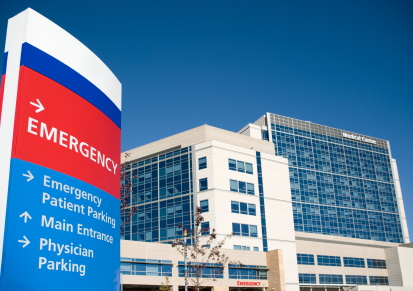
Suggests "just in case" options
While a suggestion of leaving your options open, may sound reasonable and open-minded, having an epidural optional may not be what you really want. When a health care provider tells you that you might need or want an epidural when you’re in labor, may be his way of telling you that he will encourage you to have one when you give birth.

Won’t let you go overdue
It is not uncommon to go past your due date. About ten percent of pregnancies go past their due date. Many doctors routinely induce labor at 41 or 42 weeks. Once you go past 42 weeks, your pregnancy is considered post-term. Having a post-term baby is not necessarily dangerous, but your doctor may want you to have extra monitoring. An induction or c-section is generally not necessary, even if you go overdue. Talk to your doctor about your desire to let labor happen on its own. If your doctor insists that you have to be induced if you go overdue, this may be cause for concern.

Refuses to work with a birth plan
A birth plan is a good tool for planning your labor and a way of letting your doctors and nurses know what you want and what you don’t. If you are determined to have labor a certain way, writing your goals on paper can be helpful. There is some merit to being flexible, but your doctor shouldn’t brush off your birth plan as annoying or troublesome.

Lack of excitement for natural childbirth
Lack of excitement for natural childbirth Enthusiasm and support go hand in hand. If your caregiver gets excited when you tell her you want to have natural childbirth, this is a good sign she is supportive of your decision. Lack of excitement may not signal that she is unsupportive; some people are just less expressive. However, if she points out things like “being realistic” or “giving it a try” in a less than enthusiastic manner, she may not truly be supportive of your NCB plan.

Won’t allow doulas
Birth doulas have grown in popularity. A doula is a trained professional who assists women during labor by being a support person, advocate, and care-giver. Some doctors feel uncomfortable with birth doulas. They may feel that a doula will interfere with the delivery process when you are giving birth. A good birth doula will be vocal and advocate for you to have a natural, intervention-free birth. Having this support may make the difference between having a NCB and not having one. Talk to your doctor and see how he feels about birth doulas. Allow him to meet with your doula and see what they both think of each other.

Inflexible hospital policies
It’s one thing to have a supportive doctor, but if the hospital she delivers at is not NCB-friendly, your plans may be sabotaged once you get to the hospital. Some hospitals limit how you labor, for example they only allow you to labor in one position. They might require an IV “just in case” you need it, fetal monitoring, or want you to stay confined to the bed during labor, all of which may slow down labor or result in unnecessary interventions.

Insists on continuous fetal monitoring
These days most women have continuous fetal monitoring if they labor in a hospital. In fact, according to the ACOG, 85 percent of U.S. births are evaluated by continuous fetal monitoring. The reason continuous monitoring has become so common place is because monitoring allows a doctor to know how your baby is doing at all times during labor. It is thought to alert doctors quickly if your baby has stress during labor. The problem with continuous monitoring is that it has not been proven to prevent to prevent complications like cerebral palsy or fetal death. According to the ACOG, the false positive rate for cerebral policy is actually higher than 99 percent. Instead of preventing complications, continuous monitoring has led to more c-sections and forcep deliveries.

Limitations on how long you can labor or push
A recent research study by the U.S. Consortium on Safe Labor looked at the labor patterns from the 1960s and compared them with today’s labor patterns. What they found was that while interventions like augmentation of labor with oxytocin has increased, the length of labor actually is longer now than in the past. About half of all c-sections are performed because of “failure to progress”, according to the research. However, more than a quarter of all “failure to progress” patients were only allowed to progress to 5cm before they were offered a c-section. Likewise, women are often given 30 minutes to push before they are encouraged to have a c-section. The pushing stage does generally take about 30 minutes, but there is no reason a woman cannot push for longer. If you are considering NCB, talk to your doctor and ask him about what he would do if your labor or pushing takes longer than normal.

Tells you a c-section is necessary for a large baby
Tells you a c-section is necessary for a large baby There are several valid reasons why medical professionals encourage a cesarean delivery of a large baby. Macrosomia, or a baby the size of 4500 g (around 9 lbs 14 oz), is at risk for complications during delivery including shoulder dystocia and birth trauma. Moms of macrosomic babies are at higher risk of pereneal tearing and postpartum hemorrhage. However, just because your baby is large doesn’t mean he can’t be born vaginally. Furthermore, it is difficult to estimate your baby’s size until after he is born. Researchers looked at birth data from moms who gave birth to larger babies and have found that most women who are allowed to have a trial of labor actually have a good outcome and a c-section is often unnecessary.

Unsupportive of your decisions
One of the best ways to decide if your doctor and you are on the same page with what you want for your childbirth is to discuss your goals and plans with him. If your doctor is supportive of natural childbirth and you, he should support your decisions and respond positively. If he offers input that is contrary to your way of thinking, you may want to hear him out, but in general you want him to be flexible and reasonable with your NCB plans.